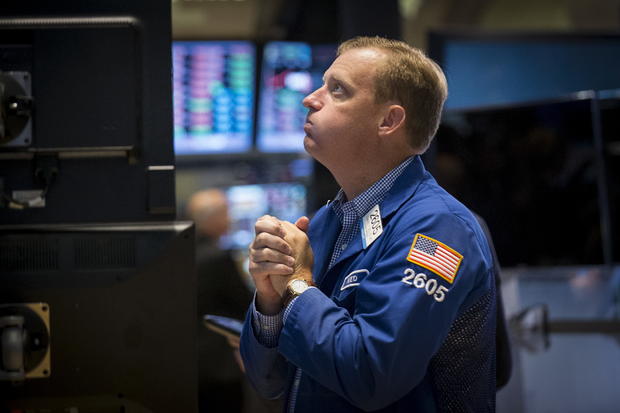Wild ride on Wall Street amid global fears
Stocks tanked at Monday's start, with the Dow plunging more than 1,000 points, following the lead set by overseas markets as an intensifying rout persisted amid worries about China's impact on the rest of the globe.
In less than 40 minutes, the Dow had recouped half of its initial losses. As of 3 p.m. ET, the Dow (DJI) was down 600 points, or 3.6 percent, to 15,858. The S&P (SPX) fell 79 points, or 4 percent, to 1,892. And the Nasdaq dropped 175 points, or 3.7 percent, to 4,531 points.
"This all starts with the stock bubble in China, and when you have a stock market that is up 160 percent in two years, from June 2013 to June 2015, which is a 60 percent annual rate of growth -- that's a bubble," Hugh Johnson, chairman of Hugh Johnson Advisors, told CBS MoneyWatch. "When you unwind a bubble, it doesn't stop at 30 percent, or even 35 percent, especially those investors are highly leveraged -- these are Chinese investors, 90 million of them -- that is precisely what is going on, and it doesn't stop at 35 percent."
Chinese investors represent more than 50 percent of foreign holders of U.S. equities, Johnson added.
On Friday, the Dow declined into correction mode, down 10 percent from its May high, as investors voiced worries that the U.S. economy is not strong enough to block events overseas, with China's slowdown of particular concern.
"Is this just a correction in an ongoing bull market, or is it the start of a bear market that will be accompanied by a recession? I don't know the answer, but I suspect not.
The Shanghai Composite Index declined 8.5 percent to 3,210 at the close to clear 2015 gains.
Chinese authorities issued notice to state media to censor negative market reports about the hefty losses, the Hong Kong-based South China Morning Post reported.
Worries about China's slowing economy and reduced demand by the world's second-biggest economy for commodities had crude-oil futures dropping $1.38, or 3.4 percent, to $39.07 a barrel on the New York Mercantile Exchange. Gold futures held at $1,159 an ounce, down 60 cents, or less than 0.1 percent.
There's also increased certainty that the Federal Reserve would not hike interest rates in September for the first time since 2006.
"The consensus has shifted from September to December for the Federal Reserve to raise interest rates, Johnson said. "The Fed is not going to ignore turmoil in the financial markets -- and also in the the bond market, the commodity market and currency markets -- the Fed is not going to ignore that."
